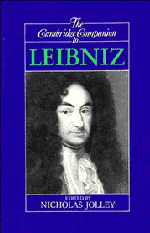Book contents
- Frontmatter
- 1 Introduction
- 2 G. W. Leibniz, life and works
- 3 The seventeenth-century intellectual background
- 4 Metaphysics: The early period to the Discourse on Metaphysics
- 5 Metaphysics: The late period
- 6 The theory of knowledge
- 7 Philosophy and logic
- 8 Philosophy and language in Leibniz
- 9 Leibniz
- 10 Leibniz's ontological and cosmological arguments
- 11 Perfection and happiness in the best possible world
- 12 Leibniz's moral philosophy
- 13 The reception of Leibniz in the eighteenth century
- Bibliography
- Index
3 - The seventeenth-century intellectual background
Published online by Cambridge University Press: 28 May 2006
- Frontmatter
- 1 Introduction
- 2 G. W. Leibniz, life and works
- 3 The seventeenth-century intellectual background
- 4 Metaphysics: The early period to the Discourse on Metaphysics
- 5 Metaphysics: The late period
- 6 The theory of knowledge
- 7 Philosophy and logic
- 8 Philosophy and language in Leibniz
- 9 Leibniz
- 10 Leibniz's ontological and cosmological arguments
- 11 Perfection and happiness in the best possible world
- 12 Leibniz's moral philosophy
- 13 The reception of Leibniz in the eighteenth century
- Bibliography
- Index
Summary
Many of the Modern philosophers, most conspicuously Descartes and his followers, seem to have played down their debt to previous philosophy and left little hint as to their background and influences. Leibniz was not in step with this trend towards setting past philosophy aside. He not only regretted the tendency in others but made a practice of locating his own discussions within a broad tradition of philosophical debate. Although he was in his own eyes a Modern philosopher, Leibniz encouraged the revival of the philosophy of the ancients and the selection from it of what was relevant to contemporary problems.' Both in his respect for past philosophers and in his willingness to draw on them in an eclectic manner, Leibniz belonged within the tradition of Renaissance humanism.
Renaissance humanism derived from the fifteenth century but continued right through the seventeenth. It had been stimulated by the discovery of manuscripts and a revival of interest in ancient writings that had long been neglected. The Renaissance philosophers had initially been in reaction against the prevailing academic (Scholastic) philosophy. The Scholastics acknowledged Aristotle simply as “the Philosopher” but, while preserving some Aristotelian terminology, they developed a style of philosophizing that was found to be obscure and unfruitful. Partly in response to Humanist critics, Scholasticism was modified and enjoyed a new lease on life in the late sixteenth century. It continued to be the dominant form of philosophy in the universities of Europe for almost the whole of the seventeenth century.
- Type
- Chapter
- Information
- The Cambridge Companion to Leibniz , pp. 43 - 66Publisher: Cambridge University PressPrint publication year: 1994
- 2
- Cited by

